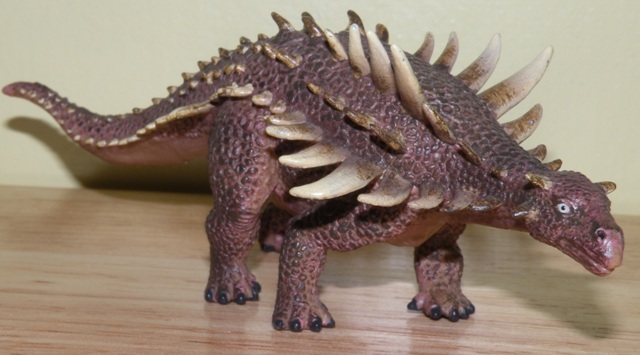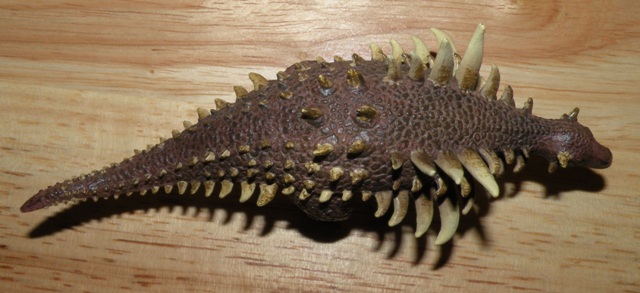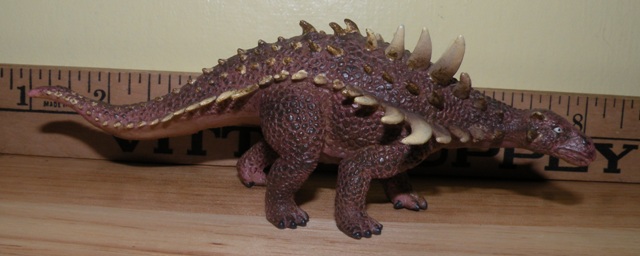I’m really starting to dig this dinosaur review thing. I’ve always enjoyed writing and learning about, and doing anything that involved dinosaurs, so naturally I would have to give this a try and as you can tell I’ve gotten fond of it. Hopefully my reviews are meeting the standards of the blog, feel free to let me know. Thinking it was time to do another review I gazed over my collection looking for a figure that hasn’t already been reviewed, not an easy task. I came across my recently acquired CollectA…ummm…what is this thing? I looked under the belly but there was no name. It looked like a generic ankylosaur and a nodosaur more specifically, but beyond that I had no clue what it was supposed to represent. I almost put it back on the shelf; I am not particularly knowledgeable regarding ankylosaurs and without even knowing the species how could I review it? In the interest of educating myself I decided to give it a try anyway. I was quite shocked to find out what my figure was supposed to represent a Polacanthus. What? Seriously?
Polacanthus is a genus of Early Cretaceous nodosaurid from western Europe. The first species discovered was P. foxii in 1865 by Reverend William Fox. The other species P. rudgwickensis was named by William Blows in 1996 and named for the village in which it was found in West Sussex, England. Enough on the details though, any one of you can read the Wikipedia page as good as I can. For what it is worth, the Wiki entry on the genus cites this animal in two pieces of pop culture; Walking with Dinosaurs and The Land Before Time.

So where to begin with this guy, well lets start on the most well known feature of Polacanthus, the large sacral shield that can be seen in just about every reconstruction of this animal. Its not there! Evidently CollectA made a Polacanthus without the one thing that might distinguish it as a Polacanthus. I realize CollectA has produced some really questionable figures but this one was made in 2008, years after WWD popularized the beast. It just goes to show you that they did absolutely no research on this animal and just tacked a name on a generic nodosaur, I’m surprised they even had the sense to omit the tail club.

Along with not having the sacral shield there are a long list of other glaring errors. The head is beak-less, narrow, and horse-like…a generic head for a generic dinosaur. The spikes are excessively long and I’m certain there are more of them than should be. The feet also have one toe too many, I guess if you’re going to do it wrong you might as well do it on all fronts.
So…what’s good about this figure? Not much. The figure is a flat brown color and covered in small pebbly scales which I guess is something to be thankful for. The pose is fairly static but at least more dynamic than the Toyway Polacanthus. The actual Polacanthus was about 16’ long and this figure at a little over 5” puts it at about 1/30 scale.

I hate to give it such a bad review because it is a cute little figure but it is what it is. I really cannot recommend this figure to those who want accuracy. If you are a die hard Polacanthus fan (and who isn’t?) then you’ll probably have to settle for locating the Toyway version, good luck with that. Hopefully this genus will someday get its due. One last note: I apologize for pushing the Sideshow Apatosaurus down the list with this thing. I’ll wait for the hate mail to start coming in. (Sideshow Apatosaurus forgives you. –Ed.)
Disclaimer: links to Ebay and Amazon on the DinoToyBlog are affiliate links, so we make a small commission if you use them. Thanks for supporting us!




I agree with this review… it is a poor model, mostly due to errors in the dermal armour. When I found the World’s second Polacanthus in 1979 it included for the first time some of the neck ring armour. These spines are unique and have never been reproduced in any model. They indicate a neck ring consisting of separate units, unlike the continuous rings of Ankylosaurids. I also found with it the first splate (spine and plate combination) for this taxon, and I suspect this comes from the pectoral region (akin to parascapular spines in stegosaurs). Again, not seen in any model. By the way, Polacanthus rudgwickensis was renamed by me as a new taxon Horshamosaurus rudgwickensis in my book British Polacanthid Dinosaurs (2015). Dr William Blows
[…] although there are actually quite a few other Polacanthus toys in the world, most of them aren’t much better. From a sculptural perspective, it looks competently executed, although it doesn’t appear to […]
Yes, this model does look generic, not like any Polacanthus I’ve seen before. I even confused it with Collecta’s Hylaeosaurus till I noticed the difference in their heads.
Aha, so it does. I think I’m going to have to watch it again tonight. 😉
The Wikipedia page on “The Land Before Time” says he was a Polacanthus.
I do remember ‘Old Rooter’ being an ankylosaur, but was he a nodosaur and specifically a Polacanthus? I don’t suppose it matters, but it’s fun guessing. 😀
Himmapann. I checked the Wikipedia page and indeed you are right, but I am right as well. There is a Polacanthus in “The Land Before Time”, it is the old Ankylosaur that comforts Littlefoot after his mother dies. Funny, I don’t recall there being a Polacanthus in “The Land that Time Forgot”.
Oh, and also, I think it was The Land that Time Forgot which featured a Polacanthus, rather than The Land Before Time. 🙂 I wondered why I don’t remember seeing it in the latter.
Hey, that’s a vicious slur on horses, saying its head is ‘horse-like’! 😉
I think they based this off of a painting. I swear I found a picture in a book which had a Polacanthus in this exact same pose and colourscheme. The same picture was also clearly the base for the deluxe Baryonyx and Iguanodon-they were identical down to the colours.
Es un modelo bastante flojo, me recuerda al Gastonia por decir algo